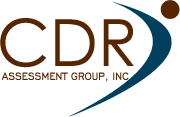Leadership derailment largely depends upon two factors:
1) the perceptions of others about your performance which includes your relationship with them, and
2) your contributions or results produced for the good of the organization
The first of the two is the most critical in terms of leadership derailment because a leader may have produced outstanding results, but if he/she has damaged relationships along the way, or has operated with a lack of integrity, derailment may be inevitable.
Some of the universal factors of leadership derailment are:
- Erosion or betrayal of trust
- Failure to deliver and be accountable
- Failure to adapt
- Lack of courage and decisiveness
- Creating or endorsing a dysfunctional work environment
- Failure to develop people and organization
- Lacks forward-looking and inspirational approach
- Lack of objectivity and broad-mindedness
Learn how to manage the risk factors that lead to derailment by attending multiple webinars hosted by CDR Assessment Group Inc. For more information or to schedule a webinar visit: http://www.cdrassessmentgroup.com/ContactUs.php
